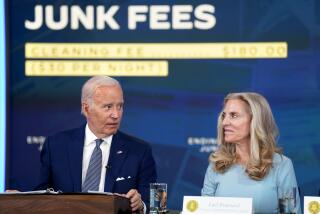Kickbacks From Your Travel Agent
- Share via
For several years some travel agents have been knowingly breaking the law and getting away with it.
They have been giving customers part of their commissions from the sale of international airline tickets, in effect discounting the price of the trip.
For example, the client buys a $1,000 ticket that may earn the agent a commission plus override payment of $100 or more. Of that commission, the agent hands back to the client $50. That effectively reduces the price of the ticket to $950, saving the traveler 5%.
Numbers differ from transaction to transaction. Some air fares cost thousands of dollars; some agents have better deals with the airlines than others and are therefore better able to wheel and deal.
But that’s essentially how it’s done. Call it rebating, call it kickbacks, call it what you will, it’s illegal under federal law.
Public Refusal
Although it has been done thousands of times, not once has an agent been prosecuted, nor has an agent been challenged by enforcement authorities.
Why? How is it possible for a large segment of any industry to thumb its nose at the law with impunity? The answer lies in the refusal--publicly stated many times--of the Department of Transportation to enforce that law.
A few years ago the Civil Aeronautics Board, the airline regulatory body at that time, ruled that rebating of airline tickets was illegal. At that time, in the early ‘80s, anybody caught risked CAB Enforcement Department disciplinary action.
Later, the federal government ruled that it was legal to rebate domestic tickets. For reasons of foreign sensitivities and trade and tariff agreements, as well as a landmark decision in a federal court of law, the ban on international rebating was never removed.
After deregulation, the CAB was disbanded and most of its authority was assumed by the Department of Transportation. With that authority came the responsibility to enforce an existing international transportation anti-rebating policy promulgated by the CAB over the years.
DOT officials didn’t believe they should be bound by a policy that was adopted by a different, now defunct body, especially as kickbacks on tickets for U.S. travel were legal. So it proceeded, quietly at first, to ignore the ban.
Seeking an Answer
After a while, travel agent groups and others started pressing the DOT to answer the question: “Is rebating of international air ticket prices legal or not?”
The answer they got was: “It’s not legal, but we don’t intend to prosecute anybody for doing it.”
How’s that for a piece of Washington doubletalk?
Some retail agents, taking the DOT’s word for it, proceeded on the assumption that it was OK to split commissions with their customers.
Others were more cautious. Samuel Goldwyn, the movie maker, is generally credited with the malapropism: “Verbal contracts ain’t worth the paper they’re written on.”
And that just about seemed to cover the situation.
On the one hand there was a long-established written policy, with all the force of federal law, that said you could be fined or jailed for rebating in the international marketplace. On the other, people in responsibility at DOT were quoted as saying that that policy could safely be ignored.
Could their public pronouncements be trusted? Or would some hotshot--maybe a new eager beaver--in the department suddenly decide that laws were meant to be enforced after all?
Still on the Books
In the event of a prosecution, it presumably wouldn’t do an agent much good to argue that he or she read somewhere that the head of the DOT said it was OK to rebate. That prohibition is still on the books.
Some took a chance and rebated to customers in an attempt to gain a marketing edge over their competitors. Others didn’t. Confusion reigned.
It still does.
What do you think if your travel agent tells you he can’t kick back some of his commission because it’s against the law while the agent across the street tells you it’s not? Today, neither is untruthful.
International rebating is against the law, yet it’s not if the DOT has agreed unilaterally to the de facto legalization of it.
The situation has, unfortunately, made many perfectly honest agents lawbreakers. And it has made other equally honest, but perhaps more squeamish, travel retailers look as if they are less generous with their clients, less anxious to offer the lowest prices possible.
Why, you may ask, doesn’t the DOT simply officially remove the policy from the books? That would seem to be the logical solution to the problem.
And so we limp on with the is-it-legal-or-isn’t-it rebating question officially unanswered.
Once and for All
The American Society of Travel Agents, the retail industry’s largest trade association, wants to put an end to the uncertainty. It has asked James Burnley, the new DOT secretary, to spell out the department’s policy on rebating, so that everybody will know where they stand.
Presumably, if the DOT formalizes in writing what has become its policy in practice, travel agents can then make their decisions about whether or not to split their commissions, based on economics, not out of consideration of the risk that they might be breaking the law.
And the public will know that if an agent refuses to share commissions it’s because the numbers don’t make sense, not because he or she fears prosecution.
Be aware that not all travel agents will agree to rebate, even if the DOT issues a positive ruling. Some don’t think they can afford it; others will refuse on principle.
More to Read
Sign up for The Wild
We’ll help you find the best places to hike, bike and run, as well as the perfect silent spots for meditation and yoga.
You may occasionally receive promotional content from the Los Angeles Times.






